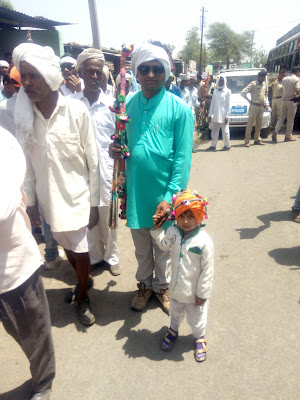This is an annual event in which the death of four members of the Adivasi Shakti Sangathan in police firing on this day in 2001 is sombrely remembered. It used to be an event of the Adivasi Shakti Sangathan till three years back when the Adivasi Ekta Parishad (AEP) decided to commemorate this event as Bhil Martyr's Day in memory of all the many great Bhil fighters who have given up their lives in the cause of Adivasi rights beginning with the exploits of Khajya Naik, Bhima Naik, Tantya Bhil and Chhitu Kirad against the British in the 19th century. Now it has become a major event in which Adivasis from all the four states of western Madhya Pradesh participate. This year the Jai Adivasi Yuva Sangathan (JAYS) too decided to take part and added a much needed youthful flavour to the proceedings.
JAYS is the epitome of modernity having been born out of a Facebook group created by a Bhil Adivasi doctor at the All India Institute of Medical Sciences, Delhi to further the rights of the Adivasis. This FB group soon gained in immense popularity among Adivasi youth in western Madhya Pradesh and today its members number in the hundreds of thousands of educated Adivasi youth. They have mass demonstrations and meetings in defence of Adivasi culture and rights. What is more important they have training workshops for Adivasi youth on important aspects of the Constitution and other laws that provide special rights and entitlements to the Adivasis, like the Fifth Schedule, the Panchayats Extension to Scheduled Areas Act and the Forest Rights Act.
The AEP too has been especially proactive in mobilising the Adivasis who are in Government Service to exert their combined power to benefit the Adivasi masses in general. The AEP has also undertaken to preserve the traditional culture of the Adivasis and every year on January 14th it organises by turns in each of the four states of Gujarat, Rajasthan, Maharashtra and Madhya Pradesh a huge cultural gathering which is possibly the biggest such gathering of its kind in India and it is completely funded by the Adivasis themselves. There is a new pride among the Adivasis in their culture and tradition and they are using modern political mobilisation to strengthen the positive aspects of these while also acting to scotch the negative aspects like witch hunting, gender based violence and patriarchal oppression of women.
Many Adivasis turned out in traditional dress for the rally in Udainagar and particularly enticing were this father and son combination shown below.
The rally was livened up by the JAYS youth and their slogan shouting. April 2nd also happened to be the day for a general strike called by Dalit and Adivasi organisations across India to protest against the Supreme Court's recent judgment ordering that there will be no immediate arrest when a complaint is filed under the Scheduled Caste and Scheduled Tribe Prevention of Atrocities Act. So first the youth went round Udainagar in motorcycles urging the shopkeepers to down their shutters till the passage of the rally. Then the rally started with people dancing to the drums and the nowadays ubiquitous music from amplifier systems which are called DJs in local parlance. The rally traversed the distance of 4 kilometers from Udainagar to the Bhil Martyrs' Memorial in Bisali and some of the youth were dressed in jeans and tee shirts with interesting slogans as shown below.
The slogan says that the price of land and the courage of the Bhils never decreases!! The rally turned into a big meeting at Bisali where the Bhil martyrs' were remembered and their family members felicitated. The memorial shown below is looked after by the venerable Deep Singh who is a burwa, a traditional medicine man and also a gayan or singer of the epic creation ballad of the Bhils.
The meeting ended with the submission of a memorandum of demands for the betterment of the lives of the Bhils to the Tehsildar or local administrator to be forwarded to the Government of Madhya Pradesh. This was followed by a community feast of maize ghat and daal. Then while the people who had come from outside went back, the local people congregated again at night to dance to the beat of the drums and the music from the DJ. After night long dancing in which as many as 15 drum beating teams took part, 18 goats were sacrificed by various villages to end the celebrations in traditional style.
What was most exhilarating was the participation of the youth, especially the educated youth who are in government service. They had taken leave for one day to come from far and wide to participate in the event and unhesitatingly criticised the Government for neglecting the well being of the Adivasis. These youth are blissfully unaware of the power of global forces that are negating the possibilities of a more equitable and sustainable development and so they are full of energy and ready to fight for their rights.



No comments:
Post a Comment